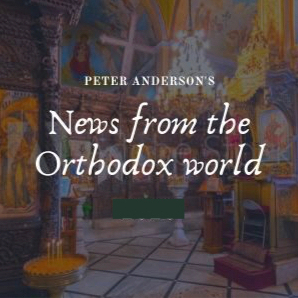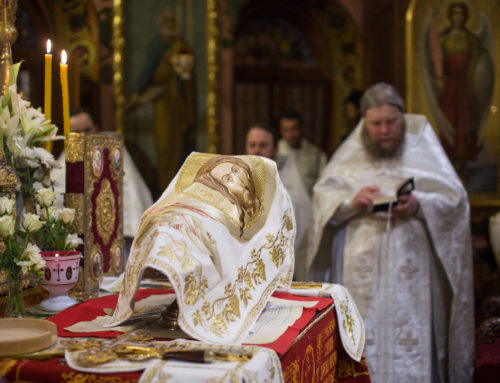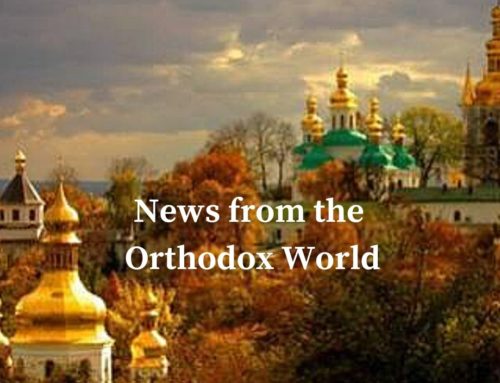Peter Anderson reports from the Orthodox world.
Longstanding reporter of the news from the Eastern Church, Peter Anderson shares our dream of a unified Christianity. His love for Orthodoxy has driven him to this personal mission to share the news of East with the world through his email list. The Urbi et Orbi Foundation is proud to share his efforts and his insights with you.

The Holy Synod of the Serbian Patriarchate met today, February 10, and confirmed that the meeting of the Assembly of Bishops to elect a new patriarch would be held in the crypt of the huge new Church of St. Sava on February 18. https://tanjug.rs/full-view.aspx?izb=629470 This comes as no surprise. On February 4, Metropolitan Chrysostom of Dabro-Bosnia, the temporary head of the Patriarchate, had specified this date to the Serbian news agency Tanjug. https://tanjug.rs/full-view.aspx?izb=627698 This is also the date designated by the Holy Synod at its meeting on December 24. The Covid situation in Serbia has recently improved (see https://www.worldometers.info/coronavirus/country/serbia/ ), so it appears that a postponement of the meeting of the Assembly will not be necessary. It has been reported that the participating bishops will be staying in the Hilton Hotel in Belgrade, a change from the more spartan accommodations provided in previous elections. https://nova.rs/vesti/drustvo/sinod-spc-odlucio-sabor-u-hramu-vladike-u-hiltonu/
The following will be the election procedure: The Assembly consists of the active bishops and vicar bishops (a total of 43 bishops) of the Serbian Orthodox Church. Two-thirds of their number (29 bishops) is the necessary quorum. Candidates for patriarch must have governed a diocese for a minimum of five years. Voting is conducted by secret ballot until one of the bishops receives a majority of the votes. This bishop becomes Candidate No. 1. Voting is then conducted again until a second bishop receives a majority. This bishop becomes Candidate No. 2. Another final round of voting is conducted until a third bishop receives a majority, and he becomes Candidate No. 3. The names each of the three candidates are then placed in sealed envelopes, and the sealed envelopes are the inserted between pages at the beginning, middle, and end of a gospel book, which is then placed on the altar. A monk will select one of the envelopes, and the bishop named in the selected envelope will be the next patriarch.
There has, of course, been much speculation in the media as to whom the three candidates will be. The names of Bishop Irinej of Bačka and Metropolitan Metropolitan Porfirije of Zagreb and Ljubljana are among the most frequently mentioned. Bishop Irinej (will be age 74 on Feb. 11) was one of the three finalists in the 2010 election for patriarch and is a very close friend of Metropolitan Hilarion (Alfeyev) of the Moscow Patriarchate. Bishop Irinej is also considered the mentor of Metropolitan Porfirije (age 59).
As you may recall, I have previously reported on the tensions between the Serbian Patriarchate and the University of Belgrade over the firing by the Patriarchate of tenured Professor Rodoljub Kubat at the University’s Orthodox Theological Facility. Today, the rector of the University, Prof. Dr. Ivanka Popović, informed the media that talks seeking to resolve the conflict between the statutes of the Faculty and the statutes of the University would resume after the election of the new patriarch. https://tanjug.rs/full-view.aspx?izb=629627
The recent protests in Russia in support of Alexei Navalny have been very much in the news. https://apnews.com/article/ap-top-news-moscow-coronavirus-pandemic-arrests-russia-085b16035e9c89ffb9919e4d94a2309c What has been the reaction of the Moscow Patriarchate to these protests? The first large protest occurred on January 23. On January 26, Archpriest Maxim Kozlov, chairman of the Synodal Educational Committee and acting rectory of the important Sretensky Seminary, was interviewed about the protests by the Church’s TV channel Spas. In view of his responsibilities, I assume that he must have frequent contacts with young people. In the interview, he discussed the protests in considerable depth. The complete transcript of the interview is found at https://foma.ru/cerkov-i-kazhdyj-konkretnyj-prihod-dolzhny-byt-otkryty-dlja-ljudej-samyh-raznyh-politicheskih-vzgljadov-protoierej-maksim-kozlov.html . A video of the interview is found at https://www.youtube.com/watch?fbclid=IwAR21mmxwbBAWiyIlL4G1KUjsWdN2CrcgPxyviEZGodq_nu2oROXE20d4afI&v=U53znwOMwwU&feature=youtu.be. Father Maxim observed that the protests show that “our society is not monolithic; accordingly, those who make decisions, determine policy, including youth policy, must proceed from this real fact.” He stated that the protests have touched mainly the younger generation, those who never lived in the times of the Soviet Union. This younger generation wishes a positive plan for their future, but things had remained the same. They ask, “How is it that we are almost in isolation, a great country with a great culture, with great achievements?” Father Maxim does not see Navalny as an answer to these concerns, but the discontent which is fueling the protests is a reality. He believes that both sides should be welcomed in the Church. A young man should be able to come to church and confess that he went too far by hating the other side, and a law enforcement officer should come and confess that he went too far in his actions against protesters. One should not hate a person that does not share one’s socio-political views and should learn the real possibility of coexistence, as members of a single nation. Father Maxim ends with the lesson learned from the terrible mistakes of the 20th century: “Lofty goals never justify the means and, declaring some hypothetical bright future for Russia, one cannot neglect the peace and well-being of people here and now. Let the person, and not the goal of the future bright, be for us what will determine our behavior.”
On January 30, Metropolitan Hilarion on his regular TV program Church and the World was asked about the number of minors that were seen in unauthorized opposition rallies. The complete text of the Metropolitan’s answer is available at https://www.patriarchia.ru/db/text/5764581.html. The Metropolitan first commented that the 8-year-old daughter of one of his assistants “suddenly started talking about Navalny at lunch, about the fact that you need to go out into the streets” based upon what she had seen on TikTok. Metropolitan Hilarion then stated: “The involvement of children and adolescents in political actions is a completely unacceptable violation of civil law and order, and the perpetrators must be held accountable for this. Indeed, there are many social problems that we can and must fight together. Indeed, the level of corruption is very high in certain state and bureaucratic structures. But this is not a reason to encourage teenagers to take to the streets.” He then drew an analogy to the Revolution of 1917 where revolutionaries and propagandist, many from outside Russia, talked about corruption, tsars living in rich palaces, and the need to distribute wealth to the poor. Knowing where the revolution led, Metropolitan Hilarion concludes that “the state should develop in an evolutionary, not revolutionary way.” Also on January 30, Vladimir Legoyda, head of the Synodal Department for Church Relations with Society and the Media, on a radio program stated that it is important to look at the current situation as a whole, without denying either the presence of internal problems in the country or the influence of foreign forces seeking to destabilize the situation. https://sinfo-mp.ru/v-r-legojda-czerkov-mozhet-byt-tolko-mirotvorczem.html (this includes a link to the complete transcript) He pointed out that the “Church can only be a peacemaker.” Young people should be aware that they can be subject to political manipulation. With respect to problems such as justice and social stratification, “it is not true when they say that nothing is being done to solve them.”
On the January 31, the day of the largest protest, Patriarch Kirill gave a homily at the Alexander Nevsky Skete near Peredelkino (the location of his residence) on the feast of the parents of St. Sergei. The complete text of the homily is found at https://www.patriarchia.ru/db/text/5763399.html . The Patriarch stressed the importance of parents. He stated: “As we know, the so-called crisis of the younger generation is taking place today. We see how often our youth literally falls into madness, losing all life guidelines, which can manifest itself outside and become known both to society and the world.” He refers to the great influence that the mass media, especially television and the Internet, have on the younger generation. He urged parents to “educate children in the Orthodox faith, instill in them the foundations of morality, which helps a person to distinguish good from evil.”
Archbishop Pavel Pezzi, the Catholic archbishop in Moscow, was interviewed by the Italian religious news agency SIR on February 5. https://www.agensir.it/europa/2021/02/05/manifestazioni-di-piazza-mons-pezzi-arcivescovo-di-mosca-urgente-dare-risposte-reali-al-disagio-della-gente/ His comments included the following: “Personally I think the Robin Hood function that the West gives to Navalny is a bit exaggerated. Having said that, it should be added that the state should be able to give the [public] square more convincing answers. Limiting oneself to regulating the manifestation of this uneasiness by law, limiting oneself to saying that everything is fine and that there are no problems, does not seem sufficient to me. Society today needs more real signals. Apart from a few excesses, people took to the streets in a peaceful and civil manner.” Today, February 10, Archbishop Pezzi gave an interview to RIA Novosti on the same subject. https://ria.ru/20210210/katoliki-1596778003.html He stated: “The entire social teaching of the Church says that any conflicts must be resolved not by violence, but through dialogue and reconciliation, by helping each other, not seeing the other as an enemy.”
Metropolitan Hilarion has given an important interview to the Serbian news service Novosti. https://www.novosti.rs/vesti/drustvo/959915/intervju-mitropolit-ilarion-ambicije-vartolomeja-prave-raskol-pravoslavlju The Russian-language version was posted on February 1. https://mospat.ru/ru/news/decr-chairman/60699/ Metropolitan Hilarion was asked a question about Ecumenical Patriarch Bartholomew wanting to be an “Eastern pope.” The Metropolitan began his answer with the statement: “Indeed, in recent years, Patriarch Bartholomew has behaved not as a coordinator in inter-Orthodox relations, as he once called himself, but as the sovereign head of the entire Church of Christ who is not subject to anyone’s jurisdiction. Such power claims are alien to Orthodox teaching.” The Metropolitan ends his answer with the statement: “I very much hope that there will be no final split in Orthodoxy, and that unity in our common Orthodox family will be restored. However, the restoration of unity is possible only by rejecting false ecclesiology and returning to strict adherence to church canons.” In my opinion, the last sentence is very important. If taken literally, it would mean that even if the a compromise were reached on Ukraine, there would still not be “restoration of unity” unless the Ecumenical Patriarch retreats from his present claims of powers in the Orthodox world. Interestingly, this last sentence, found in the Russian version, was omitted in the Serbian-language version published by Novosti.
February 12 will mark the fifth anniversary of the Havana meeting between Patriarch Kirill and Pope Francis. On that day, an online conference on the Church and the pandemic will be held at 10:00 a.m. Rome time. Cardinal Koch and Metropolitan Hilarion will participate. One can join the conference by using the link at https://www.christianunity.va/content/unitacristiani/en/news/2021/2021-02-09-fifth-anniversary-pope-francis-and-patriarch-kirill.html. On February 11, there will be another online conference commemorating the anniversary and also celebrating the launching of a Russian-language website of the famous Jesuit periodical La Civilt à Cattolica. https://sib-catholic.ru/11-fevralya-ofitsialno-otkroetsya-russkoyazyichnaya-versiya-onlayn-izdaniya-la-civilta-cattolica/ This new website is already working: https://laciviltacattolica.ru/
In other news, Metropolitan Isaias of Tamassos (Church of Cyprus), one of the Cyprian bishops who dissented from the actions taken by Archbishop Chrysostomos with respect to Ukraine, has given a long and interesting interview to Romfea.gr. https://www.romfea.gr/epikairotita-xronika/41944-o-mitropolitis-tamasou-mila-ef-olis-tis-ulis-stin-romfeagr He discusses the geo-political aspects of the tensions between Moscow and Constantinople. He asserts that primacy of the Ecumenical Patriarchate is one of ministry and not power. He uses harsh words against the Archbishop. However, he refers to the refusal of Moscow to participate in the Crete Council as a “great mistake,” because this “gave substance to all the fears of the Ecumenical Patriarch, that they want to replace him as the First in the taxis, so the existence of the Ecumenical Patriarchate is in danger.” At the end of January, the fourth Halki Summit was held on the subject, COVID-19 and Climate Change. One can watch videos of the lectures, including the address by Ecumenical Patriarch Bartholomew, through a link at https://www.ecupatria.org/2021/01/30/halki-summit-iv-reflected-on-covid-19-and-climate-change/. The Moscow Patriarchate’s DECR has created a new website with ten different languages! https://mospat.ru/ru/ Finally, the All-Belarusian People’s Assembly will be held in Minsk, February 11-12, with 2,700 people attending. The website of the Assembly is https://vsebel.by/.
Peter Anderson, Seattle USA


